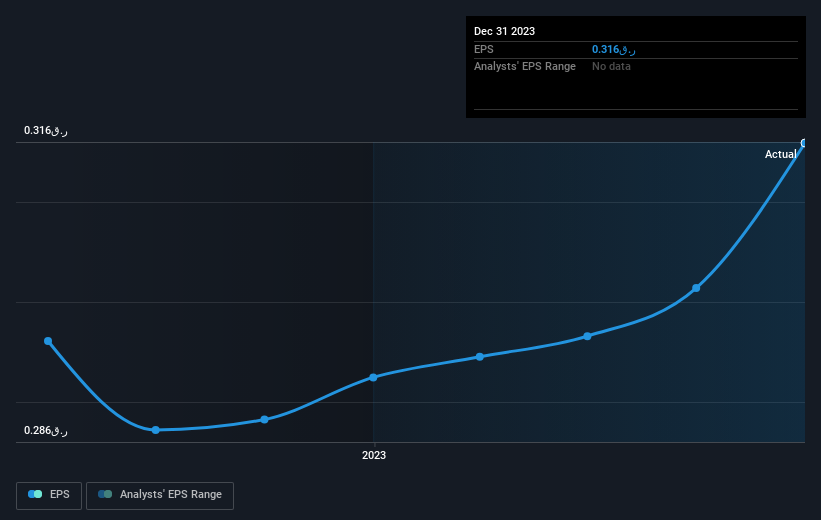Stock Analysis
- Qatar
- /
- Real Estate
- /
- DSM:BRES
Optimism for Barwa Real Estate Company Q.P.S.C (DSM:BRES) has grown this past week, despite five-year decline in earnings

The main aim of stock picking is to find the market-beating stocks. But even the best stock picker will only win with some selections. So we wouldn't blame long term Barwa Real Estate Company Q.P.S.C. (DSM:BRES) shareholders for doubting their decision to hold, with the stock down 19% over a half decade.
While the stock has risen 4.7% in the past week but long term shareholders are still in the red, let's see what the fundamentals can tell us.
View our latest analysis for Barwa Real Estate Company Q.P.S.C
While the efficient markets hypothesis continues to be taught by some, it has been proven that markets are over-reactive dynamic systems, and investors are not always rational. One way to examine how market sentiment has changed over time is to look at the interaction between a company's share price and its earnings per share (EPS).
Looking back five years, both Barwa Real Estate Company Q.P.S.C's share price and EPS declined; the latter at a rate of 8.5% per year. The share price decline of 4% per year isn't as bad as the EPS decline. The relatively muted share price reaction might be because the market expects the business to turn around.
The graphic below depicts how EPS has changed over time (unveil the exact values by clicking on the image).

This free interactive report on Barwa Real Estate Company Q.P.S.C's earnings, revenue and cash flow is a great place to start, if you want to investigate the stock further.
What About Dividends?
When looking at investment returns, it is important to consider the difference between total shareholder return (TSR) and share price return. Whereas the share price return only reflects the change in the share price, the TSR includes the value of dividends (assuming they were reinvested) and the benefit of any discounted capital raising or spin-off. It's fair to say that the TSR gives a more complete picture for stocks that pay a dividend. We note that for Barwa Real Estate Company Q.P.S.C the TSR over the last 5 years was 7.0%, which is better than the share price return mentioned above. And there's no prize for guessing that the dividend payments largely explain the divergence!
A Different Perspective
We're pleased to report that Barwa Real Estate Company Q.P.S.C shareholders have received a total shareholder return of 17% over one year. Of course, that includes the dividend. Since the one-year TSR is better than the five-year TSR (the latter coming in at 1.4% per year), it would seem that the stock's performance has improved in recent times. Someone with an optimistic perspective could view the recent improvement in TSR as indicating that the business itself is getting better with time. I find it very interesting to look at share price over the long term as a proxy for business performance. But to truly gain insight, we need to consider other information, too. Like risks, for instance. Every company has them, and we've spotted 4 warning signs for Barwa Real Estate Company Q.P.S.C (of which 2 are a bit concerning!) you should know about.
If you are like me, then you will not want to miss this free list of growing companies that insiders are buying.
Please note, the market returns quoted in this article reflect the market weighted average returns of stocks that currently trade on Qatari exchanges.
Valuation is complex, but we're helping make it simple.
Find out whether Barwa Real Estate Company Q.P.S.C is potentially over or undervalued by checking out our comprehensive analysis, which includes fair value estimates, risks and warnings, dividends, insider transactions and financial health.
View the Free AnalysisHave feedback on this article? Concerned about the content? Get in touch with us directly. Alternatively, email editorial-team (at) simplywallst.com.
This article by Simply Wall St is general in nature. We provide commentary based on historical data and analyst forecasts only using an unbiased methodology and our articles are not intended to be financial advice. It does not constitute a recommendation to buy or sell any stock, and does not take account of your objectives, or your financial situation. We aim to bring you long-term focused analysis driven by fundamental data. Note that our analysis may not factor in the latest price-sensitive company announcements or qualitative material. Simply Wall St has no position in any stocks mentioned.
About DSM:BRES
Barwa Real Estate Company Q.P.S.C
Barwa Real Estate Company is a real estate investment firm specializing in real estate projects which include residential facilities, a motor city, warehouses, and complementary commercial and retail spaces.
Established dividend payer and good value.

